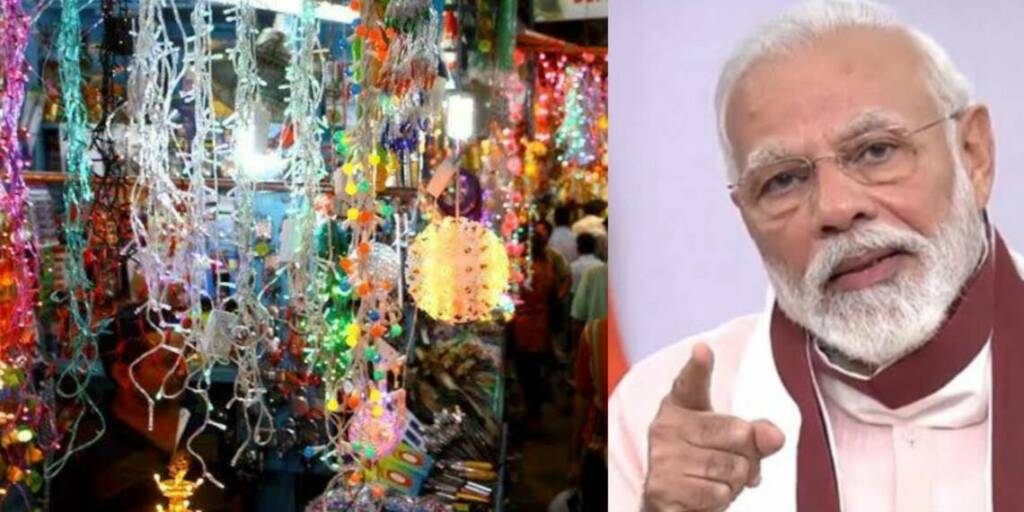The festival of Diwali is around the corner and despite all the gloom due to the COVID-19 pandemic that threw the normal lifestyle of millions around the country into a tizzy, the sales are starting to pick up due to the pent up demand and it looks like the Indian consumer market is set to be lit up during the festival season. However, with a China-made virus still lurking and the feeling of anger still fresh in the public’s memory over the martyrdom of 20 braveheart soldiers at the LAC, a strong anti-China sentiment is simmering within the consumers.
China, which usually does thousands of crores of business during India’s prime festival season is starting to get twitchy at the prospect of losing business, owing to this negative sentiment. Indian consumers are avoiding Chinese goods and with some government push, the downfall of China has started in the Indian market.
During his monthly Mann Ki Baat program last week, PM Narendra Modi had once again called for consumers to be ‘Vocal for Local’ during the festive season and it looks like his advice is paying dividends.
Still, it is pretty early to predict the final outcome of the Boycott China movement but the trends are encouraging. Shopowners have started to observe that consumers are consciously picking Indian handcrafted products over cheap factory-made generic Chinese goods.
“Chinese items are being ignored by customers. We will definitely be benefitted by it as we are keeping handmade made in India products in our shop,” said one of the shop-owners in Mumbai.
Mumbai: Shopkeepers selling earthen lamps and decorative items hope to have good business in the current festive season. They say, "Chinese items are being ignored by customers. We will definitely be benefitted by it as we are keeping handmade made in India products in our shop." pic.twitter.com/FH14wkQa5Z
— ANI (@ANI) October 31, 2020
We've made lamps that used to come from China earlier, their sale is good. We're keeping only handmade made in India products. We get orders from across the country & even from abroad. There should be marketing of our products so that more people know about us: Dilip, shopkeeper https://t.co/XTDOFFw9s1 pic.twitter.com/9ywdhqpDUf
— ANI (@ANI) October 31, 2020
Reported by TFI earlier, Chinese companies exporting goods to India are also expected to suffer Rs 40,000 crore business loss this Diwali season as the Indian traders’ community gears up to boycott the sale of goods from China.
Confederation of All India Traders (CAIT), the apex body of the traders’ union which represents 4,000 traders’ bodies and more than 7 crore traders across the country had sounded optimistic that a telling blow was in the offing for Chinese exporters.
Out of around Rs 70,000 crore business done in India every year during the Diwali season by traders, goods worth around Rs 40,000 crore were imported from China in the past years.
Reported by TFI, when the India-China border clash heightened due to continued Chinese aggression, CAIT had decided to boycott Chinese goods worth more than 1 lakh crore rupees– 13 billion dollars approximately– by December 2021. CAIT had prepared a list of 3,000 items which included toys, gifts, FMCG products, confectionery products, clothes and watches, as superior indigenously manufactured alternatives of these items were available.
Yogi Adityanath paving the way for Indian handmade Diwali diyas
After Yogi Adityanath stormed to power in Uttar Pradesh–the birthplace of Lord Ram, Ayodhya, had been put on the world map, like never before. Adityanath initiated the celebration of Deepawali on the ghats of the Saryu river by lighting up millions of earthen lamps (diya’s). The UP administration had created a record of sorts last year and this year too, the administration is bracing itself for yet another record.
It is being anticipated that this time in Ayodhya, 6 lakh earthen lamps will be lit during the festivities. It is also worth noting that the Deepotsav in Ayodhya was started in the year 2017, with the change of state government, otherwise, no government had paid any real attention to the festival and the plight of Diya makers in the state.
Only the lighting of the lamps in Ayodhya had provided employment to hundreds of skilled labors who otherwise used to sit idle, even during the peak Diwali season. Yogi’s experiment of Ayodhya is one of the many examples of how a community can collaborate amongst itself and avoid reliance on any foreign country for its sovereign customs.
Earlier, the government had also put in place norms to check if LED lights imported into the country were complying with the Bureau of Indian Standard (BIS) norms. The move was consciously aimed at reducing the imports of LEDs from China.
The Directorate General of Foreign Trade (DGF) amended the foreign trade policy to insist on quality checks with random samples picked up by the BIS for testing in recognized labs. In case a sample fails to clear the test, the entire shipment will be destroyed.
Slowly and steadily, the Indian manufacturers have successfully replaced Chinese products without many glitches in the market, while the Modi government has actively supported them. The consumers around the country have started to understand that Chinese goods, though cheaper, have no durable life, and buying them means contributing to China’s economy and ultimately funding the death of Indian braveheart soldiers.
